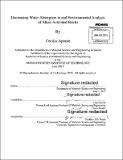Decreasing water absorption in and environmental analysis of alkali activated bricks
Author(s)
Aponte, Cecilio (Cecilio Aponte, III)
DownloadFull printable version (3.446Mb)
Other Contributors
Massachusetts Institute of Technology. Department of Materials Science and Engineering.
Advisor
Elsa Olivetti.
Terms of use
Metadata
Show full item recordAbstract
Alkali activated bricks offer an alternative to traditional clay fired bricks for use in construction in the developing world. Previous work in this lab focused on creating a robust mix formulation to create these bricks, but they faced high water absorption and were not optimized under pressure molding conditions. The motivation for the work on alkali-activated bricks is based on the claim that they have a lower environmental burden, but this claim has not yet been verified for this formulation. Thus, this thesis focused on the effects of controlled testing of formation pressure and particle size distribution on brick performance and understanding the relative environmental impacts of clay fired bricks and alkali activated bricks. It was found that water absorption and compressive strength have a strong dependence on forming pressure, with 3-day compressive strengths ranging from 7MPa to 27MPa and water absorption from 35% to as high as 60% as forming pressure increased from 5 to 35Mpa. Sieving of the ash used in the bricks to control for particle size distribution had a minimal effect on performance, but the similarity is attributed to the fact that packing density within the selected particle size ranges were similar. Further testing on controlled mixing of particle sizes is needed to see if better performance can be obtained. Life cycle assessment results verify the claim that the bricks perform better from an environmental perspective, but also show the dependence of that performance on variables such as lime content or kiln efficiency.
Description
Thesis: S.B., Massachusetts Institute of Technology, Department of Materials Science and Engineering, 2015. Cataloged from PDF version of thesis. Includes bibliographical references (pages 34-36).
Date issued
2015Department
Massachusetts Institute of Technology. Department of Materials Science and EngineeringPublisher
Massachusetts Institute of Technology
Keywords
Materials Science and Engineering.